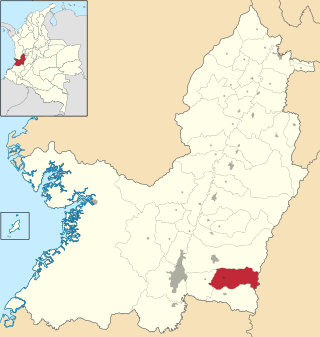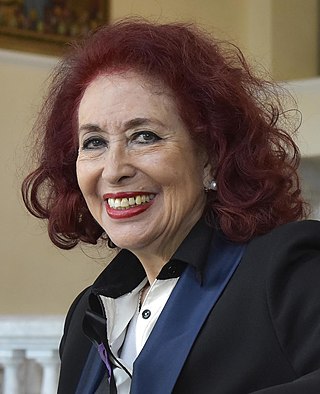
Octavio Paz Lozano was a Mexican poet and diplomat. For his body of work, he was awarded the 1977 Jerusalem Prize, the 1981 Miguel de Cervantes Prize, the 1982 Neustadt International Prize for Literature, and the 1990 Nobel Prize in Literature.

Spanish verbs form one of the more complex areas of Spanish grammar. Spanish is a relatively synthetic language with a moderate to high degree of inflection, which shows up mostly in Spanish conjugation.

Spanish is a grammatically inflected language, which means that many words are modified ("marked") in small ways, usually at the end, according to their changing functions. Verbs are marked for tense, aspect, mood, person, and number. Nouns follow a two-gender system and are marked for number. Personal pronouns are inflected for person, number, gender, and a very reduced case system; the Spanish pronominal system represents a simplification of the ancestral Latin system.

In Spanish grammar, voseo is the use of vos as a second-person singular pronoun, along with its associated verbal forms, in certain regions where the language is spoken. In those regions it replaces tuteo, i.e. the use of the pronoun tú and its verbal forms. Voseo can also be found in the context of using verb conjugations for vos with tú as the subject pronoun.

Rioplatense Spanish, also known as Rioplatense Castilian, River Plate Spanish, or Argentine Spanish, is a variety of Spanish originating in and around the Río de la Plata Basin, and now spoken throughout most of Argentina and Uruguay. It is the most prominent dialect to employ voseo in both speech and writing. Many features of Rioplatense are also shared with the varieties spoken in south and eastern Bolivia, and Paraguay. This dialect is often spoken with an intonation resembling that of the Neapolitan language of Southern Italy, but there are exceptions.

The Spanish language employs a wide range of swear words that vary between Spanish speaking nations and in regions and subcultures of each nation. Idiomatic expressions, particularly profanity, are not always directly translatable into other languages, and so most of the English translations offered in this article are very rough and most likely do not reflect the full meaning of the expression they intend to translate.[c]

Venezuelan Spanish refers to the Spanish spoken in Venezuela.

Chilean Spanish is any of several varieties of the Spanish language spoken in most of Chile. Chilean Spanish dialects have distinctive pronunciation, grammar, vocabulary, and slang usages that differ from those of Standard Spanish. Formal Spanish in Chile has recently incorporated an increasing number of colloquial elements.
Portuguese and Spanish, although closely related Romance languages, differ in many aspects of their phonology, grammar, and lexicon. Both belong to a subset of the Romance languages known as West Iberian Romance, which also includes several other languages or dialects with fewer speakers, all of which are mutually intelligible to some degree. A 1949 study by Italian-American linguist Mario Pei, analyzing the degree of difference from a language's parent by comparing phonology, inflection, syntax, vocabulary, and intonation, indicated the following percentages : In the case of Spanish it was 20%, the third closest Romance language to Latin, only behind Sardinian and Italian. Portuguese was 31%, making it the second furthest language from Latin after French.

Pradera is a town and municipality in the Department of Valle del Cauca, Colombia.
The following is a list of words and formulations commonly used as profanity throughout Romania.

José María Coronado García is a Spanish film and television actor and former model. His performances playing law enforcement officer roles have brought him some of the greatest successes of his career.

Directo A La Luz is the first live album by the Spanish power metal band WarCry, recorded in Madrid, Spain on November 5, 2005 in the music hall "Divino Aqualung" to a crowd of over 2,500 people. In the concert WarCry played various songs from every album released to that point. It was released on February 27, 2006 in digipak format DVD-CD. The CD format only contained a selection of the band's most successful songs played on the concert.
Leonardo Paniagua is one of the Dominican Republic's most popular bachata musicians. He emerged from obscurity to overnight stardom in the 1970s, when he recorded his first 45rpm record, "Amada, Amante" for Discos Guarachita.

Leticia Dolera is a Spanish actress, screenwriter, and director. She is best known for her roles as Clara in the 2013 horror film REC 3: Genesis, Teresa in Imagining Argentina (2003), and as Carmen in the UK television series Mad Dogs.
"Romeo Is Bleeding" is a song written and performed by Tom Waits, and released on his 1978 album Blue Valentine. The lyrics make frequent use of Spanish, including phrases such as "Hey Pachuco!", "Dáme esa pistola, hombre!", "Hijo de la chingada madre!", and "Vamos a dormir, hombre". Waits also makes a reference to gangster movie-star James Cagney, previously mentioned in "Invitation to the Blues" on Small Change.

Juan Carlos Pinzón Bueno is a Colombian diplomat, politician and economist. He is the current Ambassador of Colombia to the United States and former Minister of Defence. Pinzon comes from a military family, his father was a Colonel in the Colombian Army.

Cristina Ortiz Rodríguez, better known as La Veneno, was a Spanish singer, actress, sex worker, and media personality. Considered one of the more important and beloved LGBT icons in Spain since her death, she rose to fame in 1996 after being discovered in the park where she worked as a sex worker by Faela Sainz, a reporter for the late-night talk show Esta noche cruzamos el Mississippi, broadcast on Telecinco from 1995 to 1997 and hosted by the journalist Pepe Navarro. She later appeared regularly on the show as well as on La sonrisa del pelícano.

Spanish personal pronouns have distinct forms according to whether they stand for the subject (nominative) or object, and third-person pronouns make an additional distinction for direct object (accusative) or indirect object (dative), and for reflexivity as well. Several pronouns also have special forms used after prepositions.

Lidia Falcón O'Neill is a Spanish politician and writer. With a degree in law, dramatic art, and journalism, and a PhD in philosophy, she has stood out for her defense of feminism in Spain, especially during the Transition.











